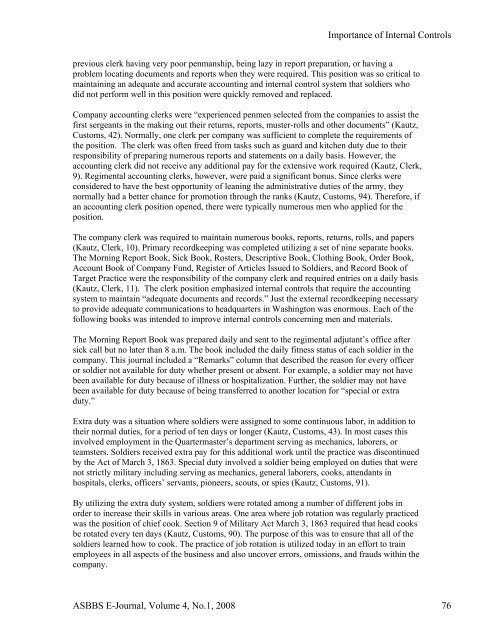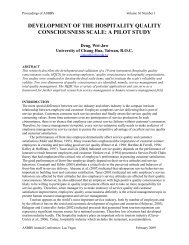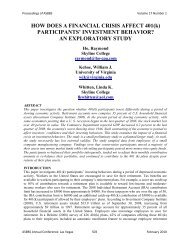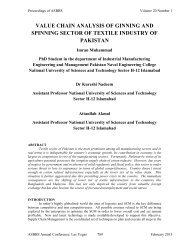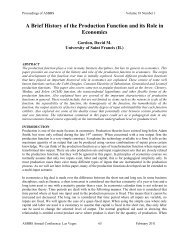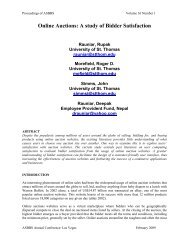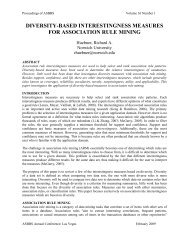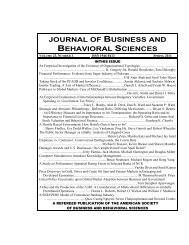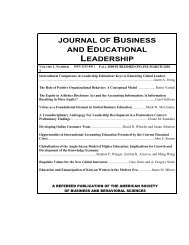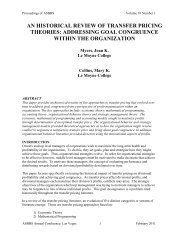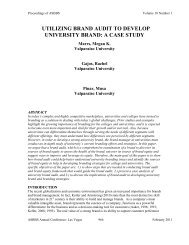stock repurchase announcements: a test of market ... - Asbbs.org
stock repurchase announcements: a test of market ... - Asbbs.org
stock repurchase announcements: a test of market ... - Asbbs.org
You also want an ePaper? Increase the reach of your titles
YUMPU automatically turns print PDFs into web optimized ePapers that Google loves.
Importance <strong>of</strong> Internal Controls<br />
previous clerk having very poor penmanship, being lazy in report preparation, or having a<br />
problem locating documents and reports when they were required. This position was so critical to<br />
maintaining an adequate and accurate accounting and internal control system that soldiers who<br />
did not perform well in this position were quickly removed and replaced.<br />
Company accounting clerks were “experienced penmen selected from the companies to assist the<br />
first sergeants in the making out their returns, reports, muster-rolls and other documents” (Kautz,<br />
Customs, 42). Normally, one clerk per company was sufficient to complete the requirements <strong>of</strong><br />
the position. The clerk was <strong>of</strong>ten freed from tasks such as guard and kitchen duty due to their<br />
responsibility <strong>of</strong> preparing numerous reports and statements on a daily basis. However, the<br />
accounting clerk did not receive any additional pay for the extensive work required (Kautz, Clerk,<br />
9). Regimental accounting clerks, however, were paid a significant bonus. Since clerks were<br />
considered to have the best opportunity <strong>of</strong> leaning the administrative duties <strong>of</strong> the army, they<br />
normally had a better chance for promotion through the ranks (Kautz, Customs, 94). Therefore, if<br />
an accounting clerk position opened, there were typically numerous men who applied for the<br />
position.<br />
The company clerk was required to maintain numerous books, reports, returns, rolls, and papers<br />
(Kautz, Clerk, 10). Primary recordkeeping was completed utilizing a set <strong>of</strong> nine separate books.<br />
The Morning Report Book, Sick Book, Rosters, Descriptive Book, Clothing Book, Order Book,<br />
Account Book <strong>of</strong> Company Fund, Register <strong>of</strong> Articles Issued to Soldiers, and Record Book <strong>of</strong><br />
Target Practice were the responsibility <strong>of</strong> the company clerk and required entries on a daily basis<br />
(Kautz, Clerk, 11). The clerk position emphasized internal controls that require the accounting<br />
system to maintain “adequate documents and records.” Just the external recordkeeping necessary<br />
to provide adequate communications to headquarters in Washington was enormous. Each <strong>of</strong> the<br />
following books was intended to improve internal controls concerning men and materials.<br />
The Morning Report Book was prepared daily and sent to the regimental adjutant’s <strong>of</strong>fice after<br />
sick call but no later than 8 a.m. The book included the daily fitness status <strong>of</strong> each soldier in the<br />
company. This journal included a “Remarks” column that described the reason for every <strong>of</strong>ficer<br />
or soldier not available for duty whether present or absent. For example, a soldier may not have<br />
been available for duty because <strong>of</strong> illness or hospitalization. Further, the soldier may not have<br />
been available for duty because <strong>of</strong> being transferred to another location for “special or extra<br />
duty.”<br />
Extra duty was a situation where soldiers were assigned to some continuous labor, in addition to<br />
their normal duties, for a period <strong>of</strong> ten days or longer (Kautz, Customs, 43). In most cases this<br />
involved employment in the Quartermaster’s department serving as mechanics, laborers, or<br />
teamsters. Soldiers received extra pay for this additional work until the practice was discontinued<br />
by the Act <strong>of</strong> March 3, 1863. Special duty involved a soldier being employed on duties that were<br />
not strictly military including serving as mechanics, general laborers, cooks, attendants in<br />
hospitals, clerks, <strong>of</strong>ficers’ servants, pioneers, scouts, or spies (Kautz, Customs, 91).<br />
By utilizing the extra duty system, soldiers were rotated among a number <strong>of</strong> different jobs in<br />
order to increase their skills in various areas. One area where job rotation was regularly practiced<br />
was the position <strong>of</strong> chief cook. Section 9 <strong>of</strong> Military Act March 3, 1863 required that head cooks<br />
be rotated every ten days (Kautz, Customs, 90). The purpose <strong>of</strong> this was to ensure that all <strong>of</strong> the<br />
soldiers learned how to cook. The practice <strong>of</strong> job rotation is utilized today in an effort to train<br />
employees in all aspects <strong>of</strong> the business and also uncover errors, omissions, and frauds within the<br />
company.<br />
ASBBS E-Journal, Volume 4, No.1, 2008 76


